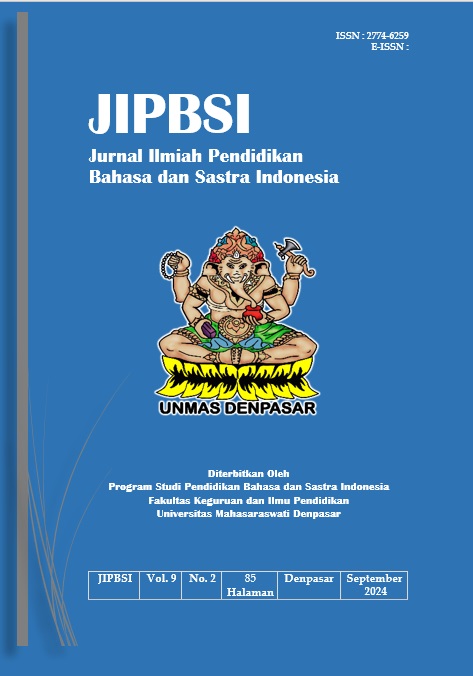PENERAPAN MODEL PEMBELAJARAN PROBLEM BASED LEARNING (PBL) UNTUK MENINGKATKAN MOTIVASI DAN HASIL BELAJAR BAHASA INDONESIA SISWA KELAS X MANAGEMENT PERKANTORAN TAHUN PELAJARAN 2023/2024 DI SMK NEGERI 1 KLUNGKUNG
Keywords:
Learning Outcomes, motivation, Problem Based Learning (PBL)Abstract
This research is classroom action research (PTK) which aims (1) To find out how the application of the Problem Based Learning (PBL) learning model can increase the learning motivation of class X Office Management students. 2023/2024 Lessons at SMK N I Klungkung, (2) Knowing the application of the Problem Based Learning (PBL) learning model can improve Indonesian language learning outcomes for Class X Office Management students Th. Lessons 2023/2024 at SMK N I Klungkung. Data collection uses observation, test and questionnaire methods. Based on the results of data processing on the application of the Problem Based Learning (PBL) learning model in Indonesian language learning in cycle I, the average score for student learning motivation was 77.94, which is in the medium category. Meanwhile, in cycle II, the average student learning motivation score was 86.06 and was included in the good category. Meanwhile, the average learning outcomes before the action were only 55 with an absorption capacity of 55%. Furthermore, in cycle I the average score of learning outcomes obtained was 70.9 with an absorption capacity of 70.9%. Meanwhile, in cycle II the average score for learning outcomes obtained was 80.00 with an absorption capacity of 80.00%. Classical learning completeness in the initial reflection was 58.3%. Cycle I was 68.6%. Furthermore, in cycle II it was 91.4%. These data show that there has been a significant increase in student motivation and learning outcomes, between pre-action, cycle I and cycle II.
References
Arikunto, S. 1996. ManajemenMengajarSecaraManusiawi. Jakarta: RinekaCipta.
Isriani & Puspitasari, D. (2015). Strategi Pembelajaran Terpadu: Teori, Konsep & Implementasi. Yogyakarta: Relasi Inti Media Group.’
Narsa, I. K. (2021). Meningkatkan hasil belajar bahasa indonesia pada materi menulis teks cerita fantasi melalui penerapan model pembelajaran problem based learning. Journal of Education Action Research, 5(2), 165-170.
Nurkencana, W. 1992. Evaluasi Hasil Belajar. Surabaya: Usaha Nasional.
Rahman, T. (2018). Aplikasi model-model pembelajaran dalam penelitian tindakan kelas. CV. Pilar Nusantara.
Sudjana. 2004. Cara Belajar Siswa Aktif Dalam Proses Belajar Mengajar. Bandung: Sinar Baru.
Suhardjono. 2007. Penelitian Tindakan Kelas. Bandung: CV Wacana Prima





